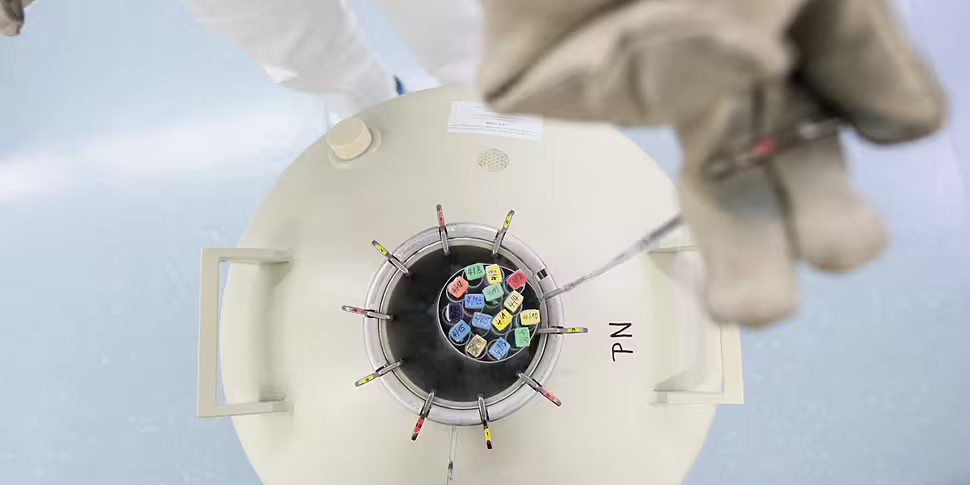A new Dublin IVF clinic is aiming to make fertility treatment more affordable and accessible in Ireland.
On Lunchtime Live this afternoon, Ireland’s leading fertility doctor and one of the founders of the Thérapie Clinic in Carrickmines Dr John Kennedy answered listener questions on all things fertility.
He started by outlining his vision for the new clinic which opened up just last week.
“What we’re trying to do is shake things up a bit,” he said. “We’re trying to provide more affordable, more streamlined, accessible fertility treatments for people in Ireland.
“We believe for a long time that an awful lot of people are going abroad - I think half of all the people doing IVF in Ireland are leaving - and that is because of cost.
“We also believe that an awful lot of people who want to access fertility treatments can’t because they can’t afford to.”
Dr Kennedy answered a host of listener questions on fertility this afternoon, with a small selection of his answers below.
“Myself and partner have just decided to start our fertility journey – where should we start?
“The basic thing to say is you should be trying to have regular unprotected intercourse. If you are under the age of 35 and you have only just started, you should give yourselves anywhere between six months and a year of trying.
“Your chances of getting pregnant any given month are probably somewhere in the region of 17% to 20%, which doesn’t sound like much but it does add up as the months go on.
“If you are over 35 and you have been trying for coming up on six months without any success, that would be the trigger to start thinking, we need to get some testing done at the very least.
“We need to maybe look and see what the semen analysis says, maybe do some bloods and see what the ovarian reserve is and make sure that you are ovulating – go and talk to somebody; start doing some digging at that point.”
“I’m 39 with a low AMH and last tested two years ago. One non-complete ICSI (Intracytoplasmic Sperm Injection) due to low egg quality. What can be done to increase egg quality and should AMH be re-tested?
“For those who don’t know what AMH is, it is a blood test called anti-mullerian hormone,” said Dr Kennedy. “It gives an idea of the ovarian reserve, how many apples are left in the barrel. Eggs are a finite resource and as you get older you use them up.
“I would say certainly, if you are over the age of 35 and if your AMH is over a year old, repeating is a very good idea. So straight away, absolutely repeat that AMH and see where we are sitting now.
“In terms of improving egg numbers and egg quality, that is the holy grail of modern fertility treatment and nobody has managed to crack it yet. It is very, very difficult to improve egg quality.
“That being said, just because you have a low ovarian reserve, that doesn’t mean you don’t have any eggs that are any good. It doesn’t mean you don’t have eggs that are good enough to give you a baby. It just means you might get less eggs from a cycle of IVF.
“It’s not to say that it can’t work but it might have a lower chance of success. So, it is something to be cognisant and respectful of but people but too much store by the quantity when really quality is a much more important marker.”
I’m 38 and just recently had a pregnancy loss, how soon should I try again?
“When you’re ready to be quite honest, whenever you are ready,” said Dr Kennedy.
“Miscarriages are tremendously unfortunate and they are also astonishingly common. One-in-four to one-in-five pregnancies is going to end in a miscarriage
“The most common reason for that is there is going to be a problem with the pregnancy of the embryo itself and of the 100,000 critical things that need to happen to make a baby grow, an important thing goes wrong at an early stage and so the pregnancy, unfortunately, stops developing.
“Understanding that is key because it means there are three things that listener needs to know.
“First and foremost, miscarriages are very common. Secondly, there was nothing she did or didn’t do that contributed to the miscarriage. Thirdly, if it is her first miscarriage, it does not make her more statistically likely to have a miscarriage in the future. Her chances of having a happy healthy baby are just the same as it was beforehand.
“As to how long, I think maybe wait for her next period and after that, go for it. I think it is a little bit of a myth that your fertility goes up for the next three months or you are better off not getting pregnant for the next three months – I think there is a lot of misinformation. When the head and heart are aligned, you should go for it.”
Dr Kennedy answered a number of different listener questions and you can listen back to them all here:









